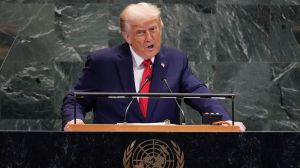Caste, cars, kids: Delhi’s upcoming data hub to log personal, household details for welfare benefits
On Tuesday, The Indian Express reported that the government is planning to create a first-of-its-kind ‘Unified Data Hub (UDH)’, which will consolidate data from various departments, to ensure only eligible people avail of the benefits of its welfare schemes.
 Officials said the unique ID number will also help citizens while registering vehicles, applying for passports, getting a water connection, or changing their address.
Officials said the unique ID number will also help citizens while registering vehicles, applying for passports, getting a water connection, or changing their address.
Names of residents, their addresses, caste, educational qualifications, number of children, vehicles owned, bank details: These are among several details of Delhiites that will be collected and soon be available in a single space on the Delhi government’s upcoming unified data platform.
The Information Technology (IT) department has floated tenders requesting proposals to implement the platform. Officials said the selected bidder will have to submit the proposal within 180 days.
On Tuesday, The Indian Express reported that the government is planning to create a first-of-its-kind ‘Unified Data Hub (UDH)’, which will consolidate data from various departments, to ensure only eligible people avail of the benefits of its welfare schemes.
The core objective of UDH is to create “golden records” of beneficiaries — single, verified, and unified data profiles of citizens — by resolving data duplication and inconsistencies across existing departmental systems, said officials.
Details that will be collected include personal and household data of citizens from all departments: ration details from the Food and Civil Supplies Department; registered household details from Delhi Jal Board, Power Department, Trade and Taxes Department; birth and death details, caste and religion information from the MCD; and others. It will also get
All this will be integrated into one platform to create a single repository, said officials.
A senior government official said, “Presently, the government uses an e-district portal to transfer benefits and subsidies of various social welfare schemes directly into the bank account of beneficiaries. But, there is no platform wherein data is readily available to plan schemes or to identify beneficiaries.”
Officials said to an extent, Aadhaar card details can help in ensuring that nobody else claims the share of benefits by impersonating a beneficiary.
“However, there are still some challenges with the process employed by the e-district/ department portal at present. For example, it primarily caters to scholarships. A 360-degree view of both the beneficiary and the state social benefit system is not available. There is no facility to collect data effectively for planning and administering social benefit schemes. It also does not maintain historical data or support household-level analysis of payouts made before Aadhaar linkage,” said the officials.
Officials said the portal has records of only registered citizens — not an exhaustive database of all eligible residents of the state — primarily pertaining to individuals and not families.
“As integrated registries are not available, onboarding of new schemes is time-consuming… All services are application-based, and a complete view of the services availed by citizens is not available. Due to this, the government has to document and collect fresh data every time a social welfare scheme or policy is being developed… For instance, the government does not have a consolidated data of women in Delhi who are eligible for the Mahila Samriddhi Yojana,” said an official.
Officials said once the hub is developed, the government will provide a unique identification number to all citizens.
“Through this, whenever a new scheme is implemented, the government will have readily available data to identify beneficiaries and decide eligibility criteria for implementing new welfare schemes… It can also monitor individual beneficiaries for inclusion into or exclusion from a particular scheme based on social and financial status,” said the official.
Officials said the data will also help the government plan and improve utilisation budgets across schemes.
Officials said the unique ID number will also help citizens while registering vehicles, applying for passports, getting a water connection, or changing their address.
Officials said a Project Monitoring Unit (PMU) is being set up to facilitate the creation of the hub.
They said the IT department has selected the Food, Civil Supplies & Consumer Affairs, WCD, Social Welfare, Revenue, and Labour departments, and the MCD on a pilot basis. It has directed these departments to nominate a nodal officer and a technical team lead of the respective departments on priority, so that the PMU may start functioning in accordance with the creation of the UDH.







